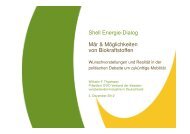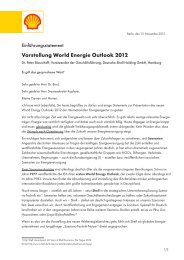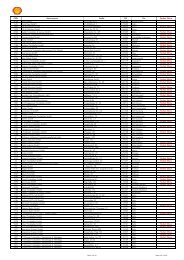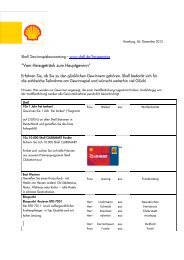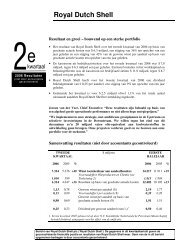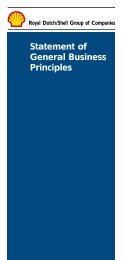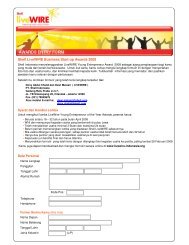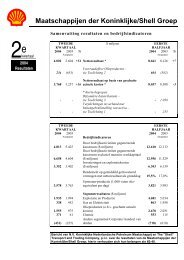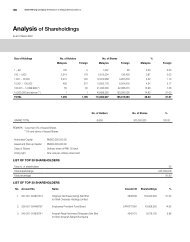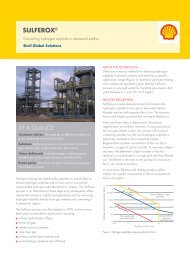62414 sustain 40pp (Mag)
62414 sustain 40pp (Mag)
62414 sustain 40pp (Mag)
You also want an ePaper? Increase the reach of your titles
YUMPU automatically turns print PDFs into web optimized ePapers that Google loves.
COUNTRIES WHERE SHELL<br />
OPERATES IN AFRICA<br />
Our contribution<br />
in Africa [A]<br />
$500 million<br />
paid in salaries to over 8,000<br />
employees in Africa<br />
$2 billion<br />
spent with African suppliers<br />
[B]<br />
$6 billion<br />
paid in corporation and<br />
sales taxes, and royalties<br />
to African governments<br />
$22 million<br />
donated through social investment<br />
[B]<br />
[A] By companies where we have a controlling interest<br />
[B] From our annual internal questionnaire (more on this data page 37)<br />
28 THE SHELL SUSTAINABILITY REPORT 2006<br />
RESPONSIBLE ENERGY<br />
Local development<br />
Our biggest contribution to development is<br />
providing the energy and petrochemicals<br />
that modern economies need. We also<br />
help local development in other ways: by<br />
generating revenues for governments and<br />
encouraging them to spend these funds<br />
wisely; by creating business opportunities<br />
for local suppliers and employment for<br />
local people; and by supporting social<br />
investment programmes, including those<br />
of the independent Shell Foundation.<br />
Turning payments to governments into<br />
social benefits<br />
Royalties are often the main source of revenue<br />
for energy-producing countries. Managed<br />
well, these funds can bring broad economic<br />
and social development. Managed poorly, the<br />
money can stimulate corruption, social<br />
inequality and conflict.<br />
While the responsibility for turning these funds<br />
into social benefits lies with host governments,<br />
we can and do help.<br />
One way is by setting a good example by<br />
following our policy of zero tolerance of bribes<br />
(page 20).The other way is by strongly<br />
supporting the Extractive Industries<br />
Transparency Initiative (EITI). It requires<br />
mining and oil companies to publish their<br />
payments to host governments and encourages<br />
those governments to be open and accountable<br />
for how the funds are spent. We see the need<br />
for the EITI only growing, as new competitors<br />
aggressively pursue business in Africa and<br />
Central Asia. In 2006, we again reported<br />
payments to the Nigerian Government and<br />
stepped up our involvement in the EITI,<br />
becoming board members and continuing to<br />
support the programmes in Azerbaijan,<br />
Cameroon, Gabon and Kazakhstan.<br />
We paid governments over $17 billion in<br />
corporate taxes in 2006, and $1.6 billion in<br />
royalties. We collected $71 billion in excise<br />
duties and sales taxes on their behalf.<br />
Buying locally<br />
Buying from local suppliers is a particularly<br />
effective way for us to encourage development<br />
in the places where we operate. It directly<br />
contributes to the local economy, creates jobs<br />
and builds skills. We actively promote the use<br />
of local suppliers and contractors and train local<br />
companies to help them meet our standards, so<br />
they can compete for contracts. For example, on<br />
the Salym oil production project in Siberia, we<br />
held a series of meetings for Russian companies<br />
that were invited to bid for major construction<br />
contracts. In these sessions, we helped them<br />
to understand our tendering and contract<br />
requirements as well as the online bidding<br />
process. As a result of this and other efforts,<br />
Russian companies had won 80% of the<br />
contracts (by value) that had been awarded<br />
by the end of 2006.<br />
We help local communities set up businesses<br />
to sell us goods and services. For example, in<br />
the Athabasca Oil Sands Project, Shell Canada<br />
helped the neighbouring aboriginal community<br />
set up trucking, maintenance, catering and<br />
security businesses. They now work for the<br />
project and other oil sands operators.<br />
Based on an annual internal questionnaire to<br />
our senior country representatives, in 2006, we<br />
had programmes in place to promote the use<br />
of local suppliers in over 90% of the low and<br />
medium income countries where we operate<br />
(more on this data page 37). It is estimated that<br />
we spent approximately $10 billion on goods<br />
and services from locally owned companies in<br />
these countries. Buying locally also helps create<br />
opportunities for minorities and women.<br />
In South Africa for example, in support of<br />
government policies, over 60% of our<br />
expenditure is with black economic<br />
empowerment companies and we continue<br />
to champion minority and female-owned<br />
businesses in the USA.<br />
Host governments sometimes set requirements<br />
for buying or hiring locally. In 2006, Sakhalin<br />
Energy again met the challenging targets of<br />
70% Russian-sourced materials and services<br />
on the Sakhalin II project (page 34).<br />
Social investment<br />
Supporting community development projects<br />
is another, smaller, contribution we make to<br />
local development. From the same internal<br />
questionnaire, our senior country representatives<br />
estimate that we spent approximately $140<br />
million in 2006, on social investment activities.<br />
The largest programmes were in Nigeria and<br />
the USA. This amount is separate from the<br />
activities of the independent Shell Foundation<br />
(see box).<br />
Additional web content:<br />
• How we are encouraging transparency in payments<br />
to governments.<br />
• Examples from our major social investment programmes.<br />
• Our full contribution to the UN Millennium<br />
Development Goals.<br />
www.shell.com/development


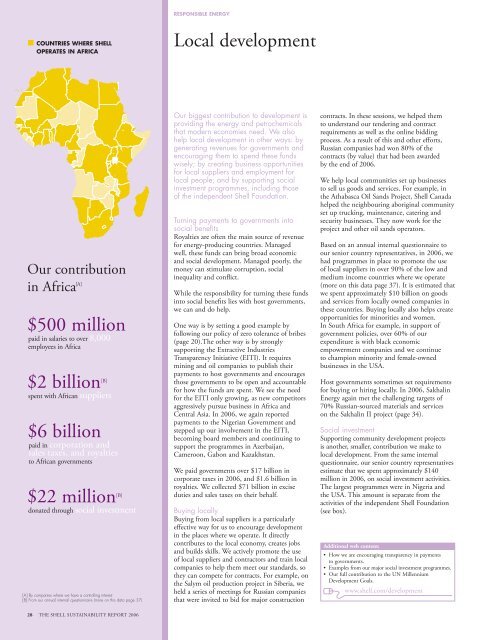

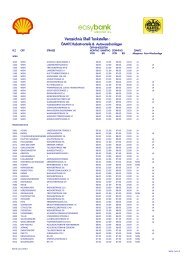
![Download Shell AutoGas Stationen [Stand: Januar 2013] (PDF](https://img.yumpu.com/9982753/1/190x245/download-shell-autogas-stationen-stand-januar-2013-pdf.jpg?quality=85)
